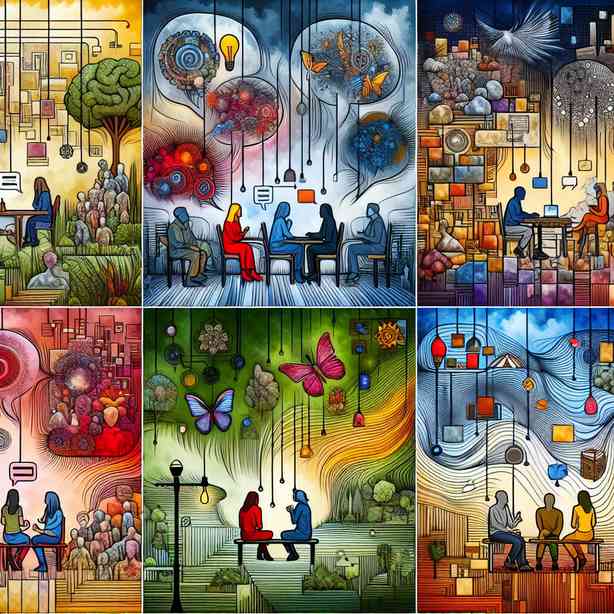
The concept of dialogue is integral to human communication, serving as a vehicle for the exchange of ideas, emotions, and cultural values. In our everyday lives, conversations form the backbone of relationships, professional interactions, and social engagements. It is through dialogue that we build understanding, resolve conflicts, and foster connections. This piece explores the profound effects of dialogue on personal development and societal evolution, drawing parallels between philosophical discourse and real-life situations.
At the core of dialogue lies the essential human desire to connect and be understood. Conversations often start with a simple greeting, yet they can evolve into meaningful exchanges that shape our perspectives. When we engage in dialogue, we not only share our thoughts but also open ourselves to the phenomenology of others. This exchange is vital because it allows us to step outside of our own experiences and consider various viewpoints. Such opportunities are critical for personal growth and refinement, as they challenge our assumptions and broaden our horizons.
Moreover, the significance of dialogue transcends the personal sphere and enters into broader societal contexts. Public discourse, whether in political arenas or community gatherings, is an expression of collective dialogue. Here, the stakes are typically higher, as the repercussions of conversations can shape policies and influence social norms. For instance, the dialogues surrounding climate change illustrate how the conversations initiated by individuals or groups can drive movements, reframe discussions, and ultimately lead to significant changes in regulations and societal behaviors. This demonstration of dialogue’s power highlights its potential as a catalyst for change and offers a compelling argument for fostering open communication channels in all spheres of life.
To further understand how dialogue resonates in our everyday lives, consider the role of active listening. Active listening is not merely hearing the words spoken; it involves fully engaging with the speaker, offering feedback, and demonstrating empathy. This cultivates an environment where individuals feel valued and understood, fostering deeper connections. In both personal and professional contexts, practicing active listening can transform dialogues into collaborative problem-solving sessions. By creating a safe space where all parties can express their thoughts without fear of judgment, we pave the way for more constructive outcomes.
In a world inundated with digital communication, the essence of face-to-face dialogue seems to be diminishing. Text messages and social media interactions often strip away the nuances of verbal communication, making it challenging to convey emotions accurately. As such, it is crucial to prioritize personal interactions whenever possible. Investing time in direct conversations can significantly enhance understanding and empathy, which are vital in today’s complex social fabric. The richness of verbal dialogues — the intonation, body language, and immediate feedback — injects a level of intimacy and authenticity that cannot be replicated in written forms.
Philosophically, dialogue also invites us to reflect on the nature of truth. The Socratic method, for instance, uses questioning as a form of dialogue aimed at uncovering deeper truths. In our conversations, whether formal or informal, we often find ourselves exploring various truths, challenging perspectives, and critically assessing our beliefs. This philosophical underpinning emphasizes the importance of dialogue not just as a tool of communication, but as a means of seeking deeper understanding and knowledge throughout our lives.
Furthermore, in addressing conflict resolution, dialogue stands out as an essential tool. Many disputes arise from misunderstandings or lack of communication. Effective dialogue allows for the articulation of differing perspectives in a respectful manner, which is crucial for de-escalating tensions. For instance, in professional environments, employing dialogue to clarify intentions and seek mutual understanding can dissolve potential conflicts, leading to stronger teamwork and collaboration. This approach fosters a culture of respect and continuous improvement, where open communication is encouraged.
Additionally, cultivating the skill of dialogue requires practice and mindful engagement. One method to enhance this skill is through reflective conversations. Reflective conversations encourage participants to share their thoughts while providing space for consideration and reflection before responding. This strategy slows down the pace of dialogue, allowing deeper contemplation and more thoughtful exchanges. Encouraging such practices in educational settings or workplaces promotes an atmosphere where dialogue is not only valued but also seen as a vital component of growth and learning.
Moreover, the role of technology in shaping dialogue cannot be overlooked. While remote communication technologies offer connectivity, they also challenge us to adapt our conversational skills to new mediums. The balance between utilizing digital platforms and maintaining the richness of face-to-face dialogue is a delicate one. As we embrace technology in our conversations, it is essential to remain cognizant of its limitations and work consciously to enhance the quality of interactions. Developing an awareness of how to use these tools effectively can greatly improve our communication strategies.
In conclusion, dialogue is a powerful instrument that echoes through every facet of our lives. It has the potential to enrich our relationships, build communities, and foster societal changes. By engaging actively, listening deeply, and embracing the philosophical aspects of dialogue, we can elevate our conversations from mere exchanges of words to profound experiences of connection. In a constantly evolving world, the skills of effective dialogue will only grow in importance, determining the contours of our relationships and the shape of our society. By prioritizing meaningful conversations and nurturing our dialogue skills, we will empower ourselves and others, forging pathways of understanding that resonate through time.


